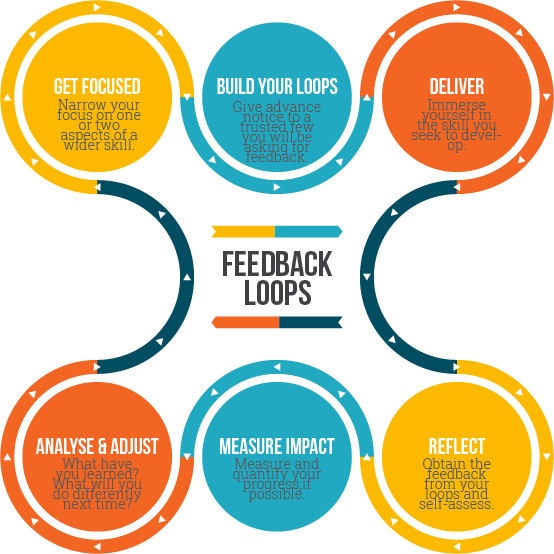What Are Feedback Loops?
Feedback loops can be found in many different areas of life, from biology to engineering to business. In skill development, feedback loops are a mechanism you can implement yourself to act as your compass, guiding you towards your ongoing continual improvement in any skill.
Feedback loops are the third and final pillar of the Dynamic Trio – a simple self-development method that can expedite you toward mastery of any skill or change.
A routine of feedback allows us to objectively learn from our experiences and improve our performance over time. By analysing our feedback and the results of our work, we can identify areas for improvement and make changes to our behaviour that will lead to better outcomes. Feedback loops also help us to stay motivated by providing us with a sense of progress and accomplishment being viewed by others.
The Three Types of Feedback Loops
Self-Generated Loop
Engage in a self-generated loop through self-assessment and reflection after every event or activity where you applied the skill or behaviour you aim to enhance. Begin by contemplating the outcomes—did you accomplish your intended goals, and if not, why? Delve into a detailed analysis of your work or approach, recognizing both the strengths and areas for improvement. This process is a crucial element in your learning journey, as genuine progress stems from insightful self-reflection.
Informal External Loop
The informal external loop involves feedback from individuals who have observed your work. Whether it’s a prompt comment from a colleague or a more delayed feedback channel, like a performance review, this external perspective offers valuable insights into your skills. Embrace external viewpoints as an opportunity to gain a broader understanding of your strengths and areas for improvement.
Formal External Loop
Formal feedback typically stems from experts or structured evaluations. Picture a music teacher offering valuable insights into your piano performance or an experienced mentor providing meticulous technical feedback on your work. An assessment from an expert is an invaluable opportunity for targeted guidance and improvement, propelling you toward refined skills and enhanced personal and professional development.
A REALLY IMPORTANT NOTE!
When implementing both informal and external feedback loops, clarity is paramount. Clearly define the specific aspects of the skill or behaviour you aim to enhance and then communicate this focus to a select group of individuals before your event or work activity. Seek their permission to approach them afterward for targeted feedback on the elements you’re striving to improve. The MAGIC LIES IN SPECIFICITY, as it significantly elevates the quality of feedback you receive. For example, rather than asking for generic opinions post-presentation, where responses may lack meaningful insights, informing your audience in advance about the specific aspects you’re working on ensures they observe with a discerning eye, ready to provide constructive feedback aligned with your improvement goals.
How to Implement Your Own Feedback Loop Process
To make the most of feedback loops in your skill development journey, follow these steps:
Get Focused
Kickstart your feedback loop by honing in on specific and focused objectives. By narrowing your focus to one or two key aspects of the skill or activity you’re developing, you make progress assessment more manageable and targeted. For instance, if enhancing public speaking is your goal, immerse yourself deeply in refining either your body language or the tone of your voice. As your feedback loops generate evidence of your advancement to the desired skill level, seamlessly transition to the next skill, such as refining the art of storytelling.
Build Your Loops
Take the next step by reaching out for external perspectives in advance. Connect with peers, mentors, or experts, and seek their input on the specific skill you’re looking to enhance BEFORE they might observe it. Beforehand, ensure their willingness to provide constructive feedback tailored to your improvement goals. Emphasize you want constructive criticism and actionable advice. Crucially, don’t postpone your request for feedback until after the event; instead, approach them in advance, allowing them to prepare thoughtfully. If you aim to transform a behavior or habit, involve individuals who frequently observe you. Invite them to proactively share observations of successful changes and instances where you may be reverting to old habits. This proactive approach ensures a more insightful and timely feedback loop.
Measure the Impact
Whenever feasible, measure and quantify your progress. Establish metrics to track the outcomes of your actions, and compare them against your initial goals. This practice enables you to gauge the effectiveness of your efforts in a tangible manner. By incorporating measurable indicators into your feedback loop, you not only gain clarity on your journey but also empower yourself to make informed adjustments for continuous improvement. It can also be incredibly motivating to see the metrics increase as a direct result of your own self-improvement.
Deliver
Immerse yourself in practical application by frequently engaging in the skill or task you’re determined to refine. Maximize your opportunities for practice or performance by collaborating with your manager or other supportive individuals to create situations that allow you to hone and showcase the skill in real-world situations. Remember, the more you immerse yourself in the practical application of the skill, the more frequent and effective your feedback loops become. It’s through consistent and deliberate practice and feedback that you pave the way for significant growth and improvement.
Reflect on Your Progress
Following each practice session or work activity centered around the skill you’re refining, ask your trusted confidants in your loops for their feedback. Listen with an open mind and be gracious. Then book time with yourself for self-assessment. Identify your strengths, areas for improvement, and whether you achieved your intended outcome. Embrace honesty and specificity in your self-evaluation, as this clarity enhances the effectiveness of your self-generated feedback loop. There can be no real learning without reflection.
Analyze and Adjust
Merge insights from any measures, self-generated, and external feedback to uncover patterns and pinpoint areas for improvement. Construct a targeted plan to address these identified areas in your subsequent practice or performance. Consider what adjustments you can make—what will you do differently next time? This proactive analysis and adaptation process ensures each iteration brings you closer to mastery.
Repeat
It’s called a loop for a reason! Regularly engage in practice, performance, and feedback-seeking. With each iteration, refine your skills further, striving for the desired outcomes and consistently positive feedback. Once you reach a point where your achievements align with your goals and feedback remains consistently positive, then initiate a new loop. Shift your focus to another key element within the broader skill or behavior you’re determined to enhance. This iterative process ensures continuous growth and mastery in all facets of your personal and professional development journey.
Feedback Loops in Action: Examples
Learning a New Language: After practicing speaking in a new language, record your sessions and listen for pronunciation errors. Seek feedback from native speakers or language instructors to refine your speech.
Coding and Programming: Share your code with colleagues or online coding communities. Incorporate their suggestions for improving code efficiency and readability.
Sales and Negotiation Skills: Record sales calls or negotiation meetings and review them. Identify areas where you can improve your communication, persuasion, or objection-handling techniques.
Project Management: After completing a project, gather feedback from team members, stakeholders, and clients. Use this information to streamline processes for future projects.
Embrace the Power of Feedback Loops as Your Guide to Mastery:
On the road to skill mastery, feedback loops are one of your most invaluable learning tools. Offering real-time insights and identifying areas for improvement, loops propel you toward your goals. These loops establish an unbroken cycle of growth, where each iteration builds upon the last, fostering the continual improvement of your skills. In the quest for expertise, feedback loops transcend mere tools—feedback loops embody the essence of mastery itself.



